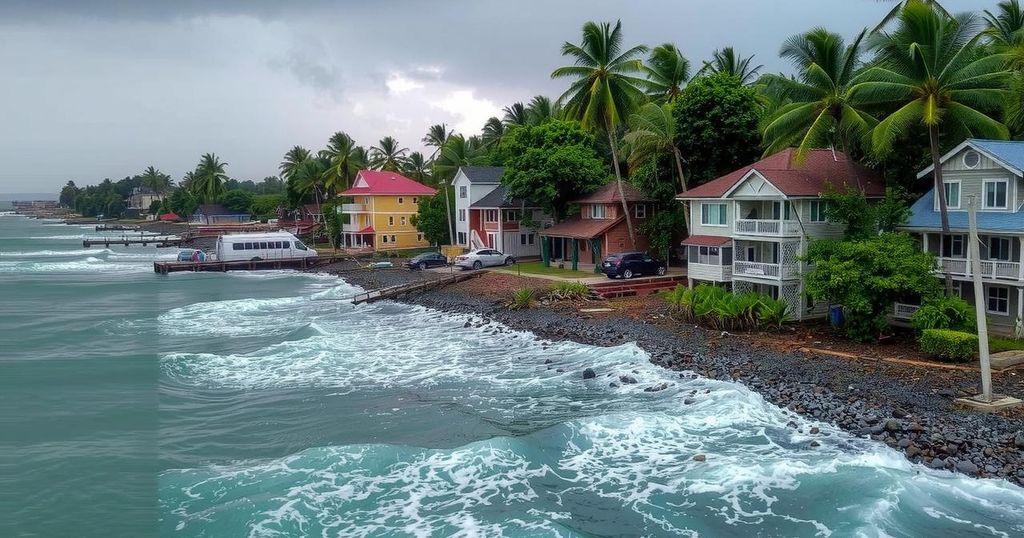Mayotte Hit by New Storm Dikeledi Following Devastating Cyclone Chido

Mayotte faces a new tropical storm, Dikeledi, just weeks after Cyclone Chido claimed at least 39 lives. A red alert has been issued due to high risks of flooding and landslides. Areas such as Mbouini have suffered severe damage. The French government is mobilizing resources while the community expresses frustration over perceived neglect, especially in the wake of recent disasters.
Mayotte has once again been impacted by a tropical storm, termed Dikeledi, just weeks following the devastation wrought by Cyclone Chido which claimed at least 39 lives and left over 200 individuals unaccounted for. A red alert has been issued across the islands, indicating a critical risk of flooding and landslides, urging residents to either remain indoors or seek secure shelter. Despite Dikeledi’s center passing approximately 62 miles south of the archipelago, heavy rainfall and strong winds have resulted in significant flooding in various areas, including the southern village of Mbouini, which was previously unscathed by Chido but is now reported to be almost completely destroyed.
The atmosphere in Mayotte has been charged with anxiety as the recovery from Cyclone Chido had only recently commenced. Emergency protocols are in full effect, with military forces and local authorities actively engaged in clearing debris and assisting residents amidst Dikeledi’s continued threat. The French interior ministry has mobilized personnel to ensure the safety and wellbeing of the population. Meanwhile, cyclone shelters have opened in schools and community centers as a precautionary measure, reflecting the dire state of readiness among local officials.
Additionally, the international airport in Mayotte, which suffered considerable damage during Cyclone Chido, has been temporarily closed. The recent natural disasters have sparked outrage among Mayotte’s residents towards the French government, particularly following President Emmanuel Macron’s visit after Chido. The community perceives themselves as neglected, raising questions concerning the government’s commitment to addressing the region’s welfare, especially given that Mayotte is the poorest territory within the European Union.
The impact of Cyclone Chido remains a pressing priority, as officials anticipate that the final death toll may reach into the hundreds, particularly given the complexities surrounding the documentation of fatalities among undocumented migrants, who often observe the Islamic tradition of immediate burial. Local leaders emphasize the need for continued support and resources for recovery from both recent storms, fearing substantial long-term consequences for this vulnerable population.
The archipelago of Mayotte, situated in the Indian Ocean between Madagascar and Mozambique, recently experienced a series of devastating weather events. Cyclone Chido struck on December 14, resulting in significant loss of life and extensive damage to infrastructure. This most recent tropical storm, Dikeledi, arrives shortly after Chido, posing additional challenges to the recovery efforts. The region is characterized by its precarious living conditions, particularly in the shantytowns surrounding the capital, Mamoudzou, and has been facing longstanding issues concerning neglect by the French government. Mayotte’s residents are grappling not only with the immediate impacts of successive storms but also with broader socio-economic challenges that exacerbate their vulnerability.
In conclusion, Mayotte is in a state of crisis as it grapples with the repercussions of two severe weather events in quick succession. The tropical storm Dikeledi has compounded the damage caused by Cyclone Chido, leading to considerable risks of flooding and landslides, and triggering widespread concern among the island’s inhabitants. The government’s response has focused on emergency mobilization and community support, yet underlying grievances regarding neglect and inadequate resources persist. The situation underscores the urgent need for comprehensive recovery strategies and a renewed commitment from authorities to support this vulnerable territory.
Original Source: news.sky.com






